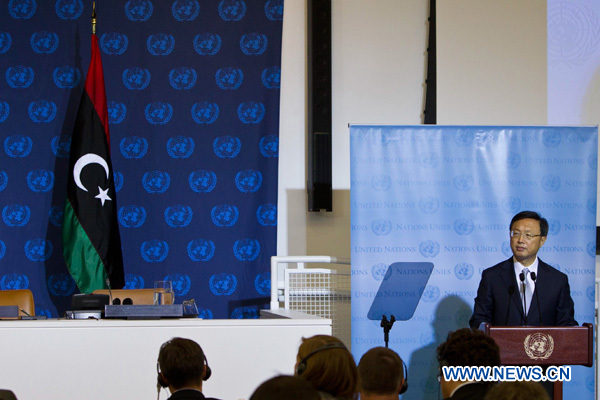Libya: a test and an opportunity for China
- By Jin Liangxiang
 0 Comment(s)
0 Comment(s) Print
Print E-mail
China.org.cn, September 21, 2011
E-mail
China.org.cn, September 21, 2011
|
|
|
Chinese Foreign Minister Yang Jiechi gives a speech during the UN high-level meeting on Libya in New York, the United States, Sept. 20, 2011. [Zhu Wei/Xinhua] |
The Libyan issue is one of the major international agendas at the beginning of the second decade of this new century, when the international system is experiencing substantial changes as a result of both the global financial crisis and the emergence of new economies. On September 12, China formally announced its recognition of the Libyan National Transitional Council (NTC). China's stance on Libyan issues has once again caught the eyes of international observers.
Despite sharing some economic ties, China has not had a particularly good relationship with Gaddafi's Libya. Gaddafi's Libya is one of the very few African countries with a sketchy record of respecting the one-China policy. Gaddafi's Libya not only allowed Chen Shui-bian, former pro-secessionism Taiwan leader to make a transit stop in the country in May 2006, but also afforded him a high-level reception.
Muammar Gaddafi also, for reasons unknown, showed an intentional lack of respect toward China a number of times on many issues. He dispatched a low-level official to attend the 2006 summit of the Forum of China-Africa Cooperation (FOCAC), while other countries were represented by either heads of state or governments. Gaddafi even attempted, unsuccessfully, to persuade some African leaders not to attend the 2006 summit of the Forum of China-Africa Cooperation. Gaddafi's Libya was also the last country to formally confirm its participation in the 2010 Shanghai Expo.
However, it seems that Beijing has not been deviated from either its purpose or its policy by such shows of disrespect. Beijing has adopted a principled but pragmatic policy with respect to the Libyan issue. On the one hand, Beijing abstained from voting for the UNSC resolution which advocated the setting up of a no-fly zone in Libya, despite the West's displeasure. Non-interference in the internal affairs of sovereign nation states is the principle which Beijing has always adhered to. Regarding the Libyan issue in particular and the so-called Arab Spring in general, China has no reason to support the West's intervention for the purpose of ideology promotion in the name of humanitarian concerns.
On the other hand, as a nation state, China has been practical with relevant issues. In June, China promised Libya humanitarian assistance to the tune of 50 million yuan. Besides, China has been in contact with Libyan opposition forces. China had its diplomats in Qatar meet with the representatives of Libya's opposition, and also had its diplomats in Egypt visit Benghazi. It even received high-level representatives of Libya's opposition in Beijing. China has demonstrated more flexibility than in other previous, similar cases. After all, China has all along regarded the peace and stability of the region as one of its principle interests, which is one part of its objectives toward maintaining a favorable external environment for economic development.
Nevertheless, China's Middle East policy is also facing obvious challenges. It is unreasonable for the West to expect Beijing to support its efforts to promote democracy as defined by the Western standards. But China does need to have its own solutions for some, if not all, of the problems in the Middle East. The last decades have seen China advance concepts such as harmonious world and peaceful development. But it is always difficult to put ideals into practice.
Britain used to manage its empire by divide and rule, while America developed such strategies as containment, offshore balance and humanitarian intervention. China has long regarded these strategies as immoral, and can therefore hardly be expected to follow them. Yet, non-interference is more a stance than a constructive solution. With the expansion of its interests and international responsibilities, China cannot avoid initiating its own solutions to global problems.
Globalization has meant that the interests of other countries near and far are closely linked with our own. The efficiency of China's withdrawal of its citizens from Libya was widely praised in international media. However, as the Libyan case indicates, China cannot always just protect its national interests by withdrawing its citizens. In these globalized, more closely-linked times, it is immoral to turn a blind eye to what is happening in other countries, however far away, in the event of a genuine humanitarian crisis.
Therefore, Libya is also a test for Beijing.
The author is a columnist with China.org.cn. For more information please visit http://www.ccgp-fushun.com/opinion/jinliangxiang.htm.
Opinion articles reflect the views of their authors, not necessarily those of China.org.cn






